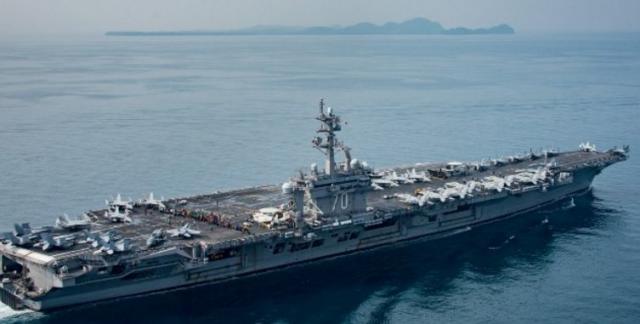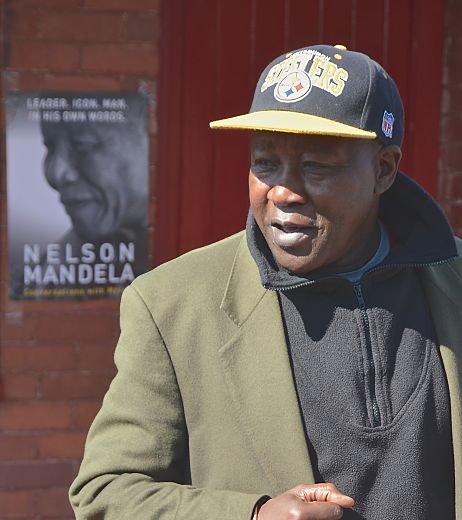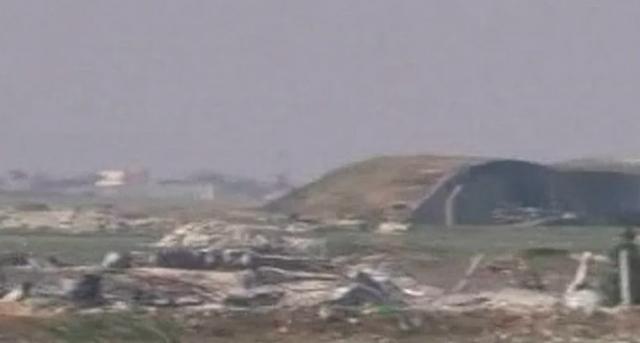It’s really very simple,
How things are going to change.
We learn what we need to know by watching
How Mr. heron stands in the marsh.
He stands until the tide ebbs
To the point where a large fish
Leaps free
As if tossed up by the water
In a floppy arc.
And then Mr. Heron stirs
Like a business man
In a dark suit,
Lifting himself slowly on wings
That never hurry.
And then you turn to me and say,
He looks sad.
Yes, it is much sadder than beautiful
To watch him fly away.
—Gary Lindorff
garylindorff.wordpress.com
No US War on North Korea
North Korea is threatening to destroy the US with its thus far largely undeliverable and sometimes unexplodable nuclear weapons, while the US, after an embarrassing navigational “mishap” that saw it steaming in the opposite direction, has successfully dispatched the USS Carl Vinson carrier battle group to a position reportedly within “strike range” of North Korea (albeit actually still in the South China Sea near the Philippines, some 1200 miles distant from North Korea). Now President Trump is threatening a possible attack on that country if it won’t halt its nuclear weapons program.
So is the Korean War, which never really ended, going to be reactivated, as scare stories are now warning?
While I often find myself the pessimist in these kinds of crises, given the penchant for US presidents to turn to war as a default foreign policy option, I’m guessing that won’t happen in this case, and for the same reason I don’t think we will see US troops confronting the determined ethnic Russian secessionists in eastern Ukraine.
It’s clear that for years the imperialist policy of the US government, under both Republican and Democratic presidents, has been to create chaos in regions of the world from the Middle East to Africa and Latin America, the better to control uppity countries like Libya, Syria, Venezuela, Bolivia and Brazil, whose leaders try to buck or stand up to US dictates. But it’s one thing to overthrow a government and decapitate its leadership in a place like Libya or Syria, where no powerful state is located nearby to defend that country. It’s altogether another to take on a country that lies right on the border of another nuclear power, as does Ukraine and the Democratic Peoples Republic of Korea.
There was nobody to come to Col. Gaddafi’s aid when US-led NATO forces attacked his government, backing rebels seeking his overthrow, and left the country a chaotic mess, which it has remained now for six years. And until Russia stepped in, the same was true of US backing for Islamic rebels seeking to overthrow Syrian President Basher Al-Assad. Ukraine was something of an exception, with the US backing a coup in 2014 that ousted the country’s elected pro-Russian president, installing in his place a pro-US regime, despite its bordering Russia. My sense is that US warmongers still thought Russia was a backwards mess in 2014, incapable of standing up and with a dysfunctional military. When Russia acted, though, and made it clear, with the annexation of Crimea and with material support of ethnic Russians in breakaway Lugansk and Donetsk, that it would brook no departure of Ukraine into NATO’s fold, the US backed off, despite plenty of bluster from the Obama White House and its laughably inept Secretary of State John Kerry.
 The USS Carl Vinson, somewhere in the Pacific…or the Indian Ocean
The USS Carl Vinson, somewhere in the Pacific…or the Indian Ocean
I’m predicting that the same thing will happen in the case of North Korea (which borders both China and Russia). The Trump administration may threaten to attack, but the bottom line is that a US attack on North Korea, or even a so-called “surgical strike” on its nuclear weapons development facility or a special forces attack on its leader, Kim Jong-un, would be viewed by China’s government as a mortal threat to their country’s national security, just as Russia views any effort to turn Ukraine into a US puppet and NATO member as a mortal threat to itself.
Two Men Who Made Their Mark On History
One man enhanced the legacy of a legend revered around the world.
Accomplishments of the other man include his involvement in a seminal court battle where the trial judge issued a pivotal ruling about racism that sparked enraged denials among authorities in that nation.
These two men made historic marks that had wide ranging impact in the countries that each adopted as their home.
While both of these men lived over 5,000-miles apart, they shared many similarities.
Both men experienced poisonous smacks from British colonial racism. Both men spent time in America. The civil rights/freedom struggles of African-Americans influenced both men. And, both men died recently, just days apart.
These two men are: Ngugi Githuka and Darcus Howe.
 Ngugi Githuka talks with tourists outside Mandela House Museum. LBWPhoto
Ngugi Githuka talks with tourists outside Mandela House Museum. LBWPhoto
Historian Githuka often worked as a tour guide in Johannesburg, South Africa. Influential activist turned journalist Darcus Howe made his mark London, the capital of Great Britain.
President MOABA: Mother Of All Bullshit Artists
Painting isn’t an aesthetic operation; it’s a form of magic designed as mediator between this strange hostile world and us. . . . It’s an offensive and defensive weapon against the enemy.
-Pablo Picasso
I think it’s a terrible shame that politics has become show business.
- Sydney Pollack
Metaphor is the lifeblood of all art.
-Twyla Tharp
To call the ever-shifting decisions and actions from Donald Trump and his team of Billionaire Big Shots a dark comedy is a natural defensive response. I do it all the time. But it may be time to recognize it has become inadequate to address our condition as citizen/victims of a looming train wreck. Donald Trump is not funny anymore.
As a New Yorker review of Stephen Colbert’s Late Show painfully suggests, the satire/journalism of a Colbert and a Jon Stewart, while sanity-saving, come up short in the face of Donald Trump as president of the United States. Bill Maher works better, because he has much more edge. It’s also true that superlatives like preposterous begin to fall short.
 Donald Trump's political world as a Jackson Pollack painting called "Jump In"
Donald Trump's political world as a Jackson Pollack painting called "Jump In"
As we watch classic authoritarianism seep into what’s glibly touted as a constitutional republic, how does journalism respond? In a “post-truth” intellectual environment where a presidential adviser can with a straight face propose “alternative facts,” how does one report anything? When absolutely everything is in question, how can answers be anything but opinions? What does journalism do when the ground underneath it is destabilized and all the truth-seeking oxygen is sucked out of the air by a Mother Of All Bombs set off in the middle of the country’s most revered faith in a free press?
The real news is the Trump phenomenon makes sense only as dark theater or evil art. This President has roots and experience not in the Law or the Military or Governing — but in the world of Finance and Entertainment. He’s a self-proclaimed master of the Art of the Deal. He made himself a TV star by his willingness and relish for firing people. He deals in superlatives; when he likes you you’re wonderful; when he doesn’t, you’re a worthless dog subject to the cruelest ridicule. The pivot from one to the other is “transactional” and can be virtually instantaneous. One minute he’s strangely sucking up to Vladimir Putin who can do no wrong and in the next he’s condemning him and bombing Russia’s close protectorate in the Middle East. For such a narcissistic Artist Of the Real, the nation itself becomes a personal canvas. Dawn Tweet storms and monstrous bombs become like concentrated daubs of cobalt blue or violently flung gobs and slashes of cadmium yellow onto the canvas of state.
Yo, Donald! Decapitating Heads of State is a Risky Business
Back in the 18th century, there was an unwritten understanding in the conduct of warfare that one didn’t kill the generals in battle. This wasn’t about protecting the elite while the “grunts” of the day slaughtered each other. It was a matter of common sense: If you killed the general, there was no one in a position to order a withdrawal or to surrender, once it became clear that one side was winning. With no general in command, things could become chaotic, leading to more bloodshed than necessary.
In the US, ever since the brief presidency of Gerald Ford, and in the wake of the Senate’s Church Committee hearings into the nefarious activities of the CIA and other secret agencies during the Nixon administration and earlier — particularly efforts to assassinate Cuban President Fidel Castro and some other national leaders — it has been US policy not to kill heads of state. In fact, a Ford executive order, number 12333, signed by President Ford in the mid 1970s, specifically bans the killing of government leaders, however brutish.
If one wants to see an example of why this is a logical policy, just look at what happened during the Obama administration, when Libyan strongman Muammar Gaddafy was murdered by his US-backed captors (with Secretary of State Hillary Clinton’s enthusiastic support), leaving Libya in a state of total chaos from which it has never really recovered.
Yet now there is talk by President Trump and his increasingly neoconservative- dominated National Security and Pentagon team of advisors of “taking out” North Korea’s leader Kim Jong-un, even as an aircraft carrier attack group steams towards the Korean peninsula.
 Trump's using a carrier battle group to 'take out' North Korea's leader Kim Jong-un could lead to unintended consequences
Trump's using a carrier battle group to 'take out' North Korea's leader Kim Jong-un could lead to unintended consequences
Getting rid of Ford Executive Order 12333 would be no difficult hurdle for President Trump, who has been “governing” the country through ill-though-out executive order issuance — most of them written by his political strategist Stephen Bannon, since he assumed office Jan. 20. Bannon, now being sidelined by more traditional cold war neo-cons, may not be writing those orders for his boss now, but someone else could easily do it, erasing E.O 12333 with the stroke of a pen.
What would such a change mean?
What am I shouting?

I saw a photo of an elephant in a concrete cell
alone,
so alone.
She was holding her own tail with her trunk
to close the circle of
herself,
a loop of loneliness,
standing, eyes closed
to the long sentence of her life.
I just would like to know. . .
What?
I just would like to know!
How can the intelligence that created such a creature
stand by and watch it suffer so.
And then I realized,
that’s me.
That’s all of us,
holding our tails in our trunks.
But were we not created to thunder
and trumpet
and love each other
as only elephants can,
crossing the great grasslands together
as a family?
And as we slumber,
to be painted silver by the moon?
So, is that it?
Because,
because . . . so many years of standing back
and watching things unravel
have taken a toll on me,
on my elephant nature.
And so I shout out
into the tornado,
but what I shout
even I don’t
know.
—Gary Lindorff
https://garylindorff.wordpress.com
What am I shouting?
I saw a photo of an elephant in a concrete cell
alone,
so alone.
She was holding her own tail with her trunk
to close the circle of
herself,
a loop of loneliness,
standing, eyes closed
to the long sentence of her life.
I just would like to know. . .
What?
I just would like to know!
How can the intelligence that created such a creature
stand by and watch it suffer so.
And then I realized,
that’s me.
That’s all of us,
holding our tails in our trunks.
But were we not created to thunder
and trumpet
and love each other
as only elephants can,
Yet Another President Commits the Ultimate War Crime of Launching a War of Aggression
NOTE: To find an anti-Syria War protest near you, go to: UNAC’s Facebook page
President Donald Trump campaigned last year making the sensible argument that the US should no longer engage in a policy of regime change, and should attempt to have friendly relations with other countries like Russia and China. Yesterday he blew those ideas out of the water by launching 59 Tomahawk missiles at Syria’s Shayrat airbase (reportedly killing nine civilians and injuring more) and by calling for the removal of Syria’s leader, Bashar al Assad.
The pretext for the US cruise missile blitz, an alleged attack on a rebel-held town called Khan Shiekhun in Idlib province, where some 70 people, including children, were reported to have died from illegal Sarin-gas bombs said to have been dropped by Syrian planes, has yet to be investigated by any independent observers. US aircraft also recently killed over 200 civilians, mostly women and children, in bombings in Mosul in Iraq.
Like many pretexts for war that have been used by the US to justify its illegal attacks on other nations over the years, dating back at least to the faked claim of a North Vietnamese attack on a US destroyer of the country’s coast in the Gulf of Tonkin which led to an all-out US war against the peoples of Indochina, and the fraudulent claim that Saddam Hussein was building “weapons of mass destruction” that led to the US invasion of Iraq, there are many questions about who really used Sarin gas at Khan Shiekhun, a city under the control of an Al-Qaeda rebel group. All information about the attack has come from sources there, where no Western reporters or independent investigators are allowed, and from the so-called “White Helmets” — a supposedly humanitarian volunteer organization that calls for the overthrow of the Syrian government and that openly backs Al-Qaeda rebels. (Critics have noted that high-quality photos of the dead appear staged, with White Helmet rescuers shown not using any protective clothing or even gloves, even though residue of Sarin, a nerve gas, can kill or injure even those whose skin touches it.)
 Syrias Shayrat air base in Homs Province after a massive attack by 59 US Tomahawk cruise missiles ordered by President Trump
Syrias Shayrat air base in Homs Province after a massive attack by 59 US Tomahawk cruise missiles ordered by President Trump
We already know that the supposed Sarin gas attack on a neighborhood in Damascus, which nearly led to an all-out attack on Syria by the US under President Obama in 2013 — a criminal war that was only prevented by Russia stepping in with a deal to supervise the removal and destruction of all of Syria’s stocks of chemical weapons — was actually a “false flag” attack conducted by Syrian rebels using Sarin supplied from Turkey — the same rebels who now control Khan Shiekhun. Unmentioned in US reports and government statements about the missile attack is the fact that the UN’s Organization for the Prohibition of Chemical Weapons (OPCW) had already investigated and monitored the removal and the destruction of all Syria’s chemical weapons by 2016, and had declared that such chemicals and weapons had all been eliminated or removed from the country under the terms of an agreement reached between the US, Russia and Syria.
Commemorate This!
The VA in Maine recently partnered with the Pentagon to hold a “fiftieth anniversary observance of the Vietnam War.” I’d caught a brief notice about the event in the county weekly. Vietnam veterans would be recognized for their “valor and sacrifice,” and those in attendance would “receive a commemorative pin in recognition of their service.” Among the fifty states, Maine is 39th in size and 41st in population, or slightly larger than South Carolina, and slightly less populous than Hawaii. A disproportionately high number of Mainers served in the military. The Veterans Administration here has its largest campus at Togus near the state capital of Augusta, and the parking lot that morning was crammed with the dusty pickups and SUVs of Nam vets who’d driven in for this gathering from every backwater of our rural state.
 Maine Governor Paul LePage and the Pentagon's commemoration project seal
Maine Governor Paul LePage and the Pentagon's commemoration project seal
This is my health provider, so over the past few decades I’d been to Togus more times than I care to count. But until that morning, I’d never been aware of the two hundred seat theater behind a paneled wall in the corridor I pass through every time I come here. All those posters I’d seen on the walls about events I had no interest in, this was the venue where they held them. I walked in a half hour early and loitered in the aisle hoping to get a few guys to tell me bits of their stories; I looked for anyone wearing something – usually a ball cap – that said Vietnam. It’s a delicate business. I ask, Hey who’d you serve with?, and usually get back a few mumbled monosyllables in reply. My typical reflex to this brushoff is the unkind thought that perhaps their experiences in-country weren’t hairy enough to back up the tough war vet exterior they’re now projecting; but the formality of being an object of attention breeds caution in this population, and maybe they just want to get to their seats.
Commemorate This!
The VA in Maine recently partnered with the Pentagon to hold a “fiftieth anniversary observance of the Vietnam War.” I’d caught a brief notice about the event in the county weekly. Vietnam veterans would be recognized for their “valor and sacrifice,” and those in attendance would “receive a commemorative pin in recognition of their service.” Among the fifty states, Maine is 39th in size and 41st in population, or slightly larger than South Carolina, and slightly less populous than Hawaii. A disproportionately high number of Mainers served in the military.
